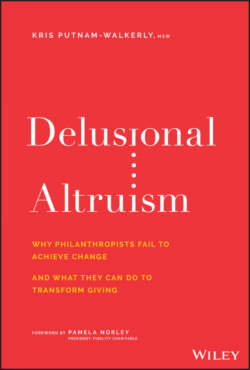Читать книгу Delusional Altruism - Kris Putnam-Walkerly - Страница 27
Fear of Not Being a Good Steward
ОглавлениеMost funders, like you, take their role of philanthropic stewardship seriously. This might mean ensuring that your foundation exists in perpetuity, or that monies allocated from your giving circle are aligned with your goals. This is especially true for professional staff of family offices and foundations—people responsible for giving away someone else's money.
This appropriate sense of responsibility can turn into fear when you worry that you aren't being diligent enough. Fear of not being a good steward can spiral into a scarcity mentality.
For example, if you're inappropriately fearful, you might do things like make smaller grants to try and stretch the funds, give a one-year grant because you worry the money won't be well spent, or force grantees to jump through excessive and punitive hoops in the name of due diligence.
One global philanthropy expert, Charles Keidan, now editor of the global philanthropy magazine Alliance, recalled this happening to him during his first foundation job in the UK.
When I directed a family foundation, I was tougher on grantees than I would be today. I was cognizant that in the early days, the family was making big gifts to organizations based on fundraising appeals at a gala, more on the basis of relationships than evidence. I felt we had to use the money well, to be catalytic and strategic. So, I asked grantees questions they weren't ready to answer. My motivation was good, but my execution was impatient and unsympathetic.3
One Eastern European donor wanted to position his foundation as more innovative and strategic by offering general operating funding and making it easier for nongovernmental organizations (NGOs) to apply. Although it was a family foundation, he relied heavily on the advice and guidance of lawyers, accountants, and auditors from his business. Once they got involved, the simple process designed to give NGOs a lot of freedom in how they used their funding spiraled out of control.
His business advisors didn't trust the NGOs and began changing the rules. They asked fear-based questions such as, “How do we know these organizations won't steal the funds if we provide general operating support?” and “How do we know if they manage their books properly?”
They turned what was supposed to be an easy application process into a full-blown audit. They insisted on looking into the NGOs' bank accounts and accounting documents. They created a massive application process. They even asked the charities to create a separate bank account to receive the funds so they could track how the money was spent.
This scarcity mentality held the charities hostage. Instead of quickly receiving flexible funding, they had to wait nine months for a grant to fund a specific program. They had to invest a lot of their time managing and reporting on the grant. The donor allowed his fearful advisors to have this influence and inflict a scarcity mentality on his foundation. In doing so, he got in his own way.
